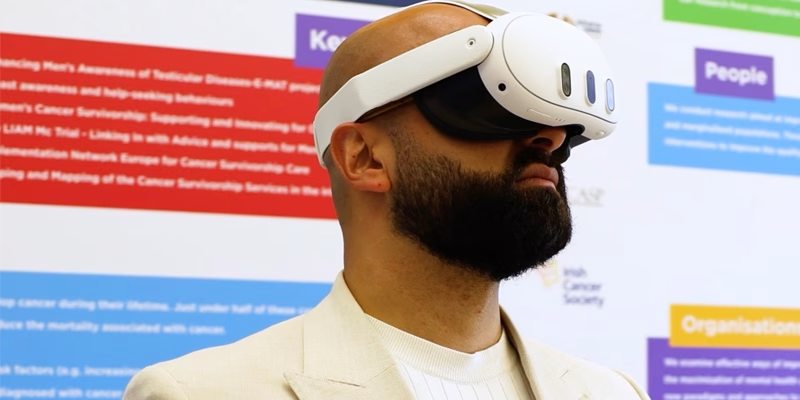
Exploring the Role of University College Cork in Healthcare Innovation and Support for Testicular Cancer Survivors
Recent developments at University College Cork (UCC) highlight the institution’s commitment to advancing healthcare through innovative research and technological solutions. Notably, UCC has received significant funding to lead a groundbreaking project that aims to improve the quality of life for young men affected by testicular cancer, a disease that, despite high survival rates, leaves many survivors facing long-term physical, psychological, and social challenges.
At the heart of this initiative is the use of Extended Reality (XR) technology, including Virtual Reality (VR) and Augmented Reality (AR), to develop immersive educational tools that support cancer survivorship. This project exemplifies how academic institutions like UCC are leveraging digital innovation to address real-world health issues, offering new hope and resources for survivors and healthcare professionals alike.
Understanding Testicular Cancer and the Need for Supportive Interventions
Testicular cancer is identified as the most common cancer among males aged 15 to 39 in Europe, with incidence rates doubling over the past four decades. Despite a remarkable survival rate exceeding 95%, many survivors face ongoing health complications, including cardiovascular issues, mental health concerns, and difficulties reintegrating socially post-treatment.
This reality underscores the necessity for tailored survivorship resources that go beyond conventional medical care. Survivors often report a lack of accessible, engaging information about managing chronic health impacts and maintaining psychological well-being. The TRANSCEND-XR project at UCC aims to fill this gap by creating digital environments that can educate, motivate, and empower survivors to take control of their health outcomes.
How Extended Reality (XR) Is Transforming Cancer Survivorship Support
The application of XR technology in healthcare is transforming how educational and therapeutic interventions are delivered. Unlike traditional approaches, immersive XR experiences can provide highly engaging, interactive scenarios that resonate with digital-native young adults. For testicular cancer survivors, such tools can demystify medical information, promote self-examination routines, and reduce anxiety related to health management.
The TRANSCEND-XR project plans to develop a fully immersive, evidence-based XR platform designed with input from survivors, clinicians, and researchers. The digital platform will include elements of VR, AR, and other Digital Reality formats, tailored to resonate with young people’s digital fluency and preferences. This approach ensures that educational content is not only accessible but also engaging enough to foster real behavioral change.
Research and Development Process at UCC
Led by Dr. Mohamad Saab, Senior Lecturer at UCC’s School of Nursing & Midwifery, the project involves a multidisciplinary team comprising clinicians, XR developers, epidemiologists, and even testicular cancer survivors themselves. This collaborative framework guarantees that the developed solutions meet real needs and are grounded in solid scientific evidence.
The development process involves co-creating the XR experiences, conducting rigorous evaluations, and adapting the interventions based on feedback from pilot users. The ultimate goal is to demonstrate the effectiveness, feasibility, and cost-efficiency of these immersive tools through a large-scale, multi-country trial involving 230 testicular cancer survivors across Europe.
Impact on Healthcare and Survivor Empowerment
The successful implementation of the TRANSCEND-XR project at UCC could have far-reaching implications. Firstly, it establishes a new paradigm for post-cancer care—integrating innovative digital tools into routine healthcare practices. Secondly, by involving survivors directly in the design and evaluation process, the project emphasizes patient-centered care that values lived experiences and individual needs.
Furthermore, as the project plans to translate these research findings into policy and educational settings, it is poised to influence healthcare approaches beyond Ireland. The scalability of XR-based interventions means that other regions and institutions can adopt similar strategies, ultimately enhancing survivorship support globally.
Building a Sustainable Model for Healthcare Innovation
University College Cork’s leadership in this project reflects its broader strategic commitment to healthcare innovation, research excellence, and societal impact. The inclusion of long-term governance, sustainability plans, and pathways for scaling solutions indicates a mature approach to integrating technological innovations into healthcare systems.
UCC’s XR Innovation Sets New Standards in Healthcare Support
University College Cork’s pioneering work with the TRANSCEND-XR project exemplifies how academic institutions can lead transformative efforts in healthcare. By harnessing XR technology to support testicular cancer survivors, UCC is setting new standards for survivorship care—focused on empowerment, education, and sustainable innovation. As this project progresses, it promises to bring tangible benefits to survivors and healthcare systems alike, demonstrating the vital role of research-driven technological solutions in improving lives.
To learn more about studying at UCC, fill out the form to receive personalized guidance from an expert counselor. Whether you’re exploring program options or preparing your application, we’re here to help you every step of the way as you begin your academic journey in Ireland.

